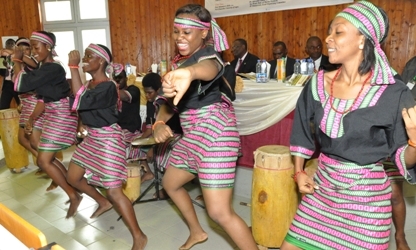 From the time the plane landed and we stepped onto Nigerian soil, the compassion and hospitality began. The friendship and warmth of our host, Orish Orisakwe, the inaugural 2012 SOT Global Scholar winner, met us with a smile and open arms that quickly put the stress of our long trip and the many required vaccinations behind us. Our accommodations were delightful and we got to experience a wide variety of local food and drink. “Point and kill” was a unique mechanism by which one’s dinner could be selected. In this case, one points to a fish in the bucket and within minutes it is served hot in any one of a number of different appetizing scenarios, the best being hot and spicy fish soup. That, along with the palm wine, made for a delightful meal. Pictured at the left are the dancers who welcomed attendees on the second day of the meetng.
From the time the plane landed and we stepped onto Nigerian soil, the compassion and hospitality began. The friendship and warmth of our host, Orish Orisakwe, the inaugural 2012 SOT Global Scholar winner, met us with a smile and open arms that quickly put the stress of our long trip and the many required vaccinations behind us. Our accommodations were delightful and we got to experience a wide variety of local food and drink. “Point and kill” was a unique mechanism by which one’s dinner could be selected. In this case, one points to a fish in the bucket and within minutes it is served hot in any one of a number of different appetizing scenarios, the best being hot and spicy fish soup. That, along with the palm wine, made for a delightful meal. Pictured at the left are the dancers who welcomed attendees on the second day of the meetng.
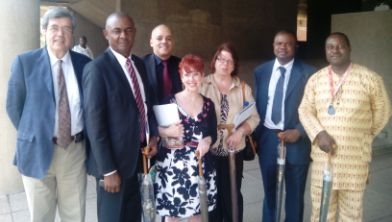 SOT members Judith T. Zelikoff, Alvaro Puga, and José E. Manautou were joined by Catherine B. Klein, past president of the Environmental Mutagenesis and Genomics Society (EMGS), to attend the third annual West African Society of Toxicology (WASOT) Conference, held from February 19‒22, 2014 at the University of Lagos campus in Akoka, Nigeria. It was an amazing scientific meeting that attracted over 100 scientists, students, and postdoctoral trainees. The theme of the 2014 conference was “Global Understanding of Chemicals in Health, Diseases, and Economics” with six sub-themes ranging from environmental pollution and risk assessment to herbal medicine.
SOT members Judith T. Zelikoff, Alvaro Puga, and José E. Manautou were joined by Catherine B. Klein, past president of the Environmental Mutagenesis and Genomics Society (EMGS), to attend the third annual West African Society of Toxicology (WASOT) Conference, held from February 19‒22, 2014 at the University of Lagos campus in Akoka, Nigeria. It was an amazing scientific meeting that attracted over 100 scientists, students, and postdoctoral trainees. The theme of the 2014 conference was “Global Understanding of Chemicals in Health, Diseases, and Economics” with six sub-themes ranging from environmental pollution and risk assessment to herbal medicine.
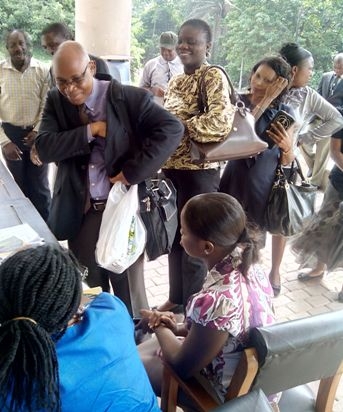
Pictured above are SOT visitors and hosts including (from left to right) Alvaro Puga, Orish Ebere Orisakwe (WASOT President), José E. Manautou, Judith T. Zelikoff, Catherine B. Klein, Kingsley Patrick–Iwuanyanwu (WASOT Assistant Secretary), and Babatunde Bolaji (WASOT, Publicity and Financial Secretary). Dr. Puga was the keynote speaker, and scientific lectures, along with presentations on grantsmanship, careers in toxicology, and a “Day in the Life of a Toxicology Researcher,” were given by all four US toxicologists over the three days.
Amongst the many lectures from Nigerian scientists and students were numerous posters for viewing. The poster presentations were all outstanding and three top winners were selected who each received a cash prize. Pictured at the left are some of the scientists who particiated in the WASOT Meeting. Moreover, there was a surprise awaiting us during the meeting when we were all escorted to a radio station with a listening audience of 16 million, for this interview live about the meeting and environmental issues that face Nigerians. Following the scientific meeting, a cocktail hour and dinner reception were held for the attendees and invited guests.
After the meeting, the four US scientists toured Lagos and visited a huge E-waste recycling center that did much to capture our imagination. E-waste is a serious issue (pictured below at the left). After electronics have been picked over, the material is burned to reduce the surface area of the pile (pictured at right below).
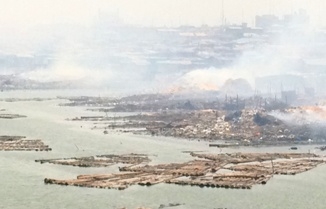
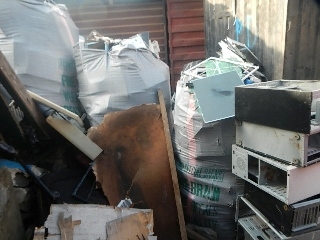
The WASOT Executive Board profoundly thanked SOT for contributing to this meeting and helping to make it a success. The Subcommittee for Non-SOT Meetings provided Global Initiatives Funding for Drs. Puga and Manautou to attend WASOT and also generous financial support.
Dr. Zelikoff received Global Senior Scholar Exchange Program funding to go to Nigeria as the Host for Scholar Dr. Orisakwe. One of the other outcomes of the exchange is the recent publication of Orisakwe OE, Blum JL, Sujak S, and Zelikoff JT. (2014) Metal Pollution in Nigeria: A Biomonitoring Update. J Health and Pollution 4(6):40-52
Overall, the trip to Nigeria provided each of us with eye-opening experiences, as well as many opportunities to meet and discuss toxicology with outstanding West African scientists and students. Prior to departing, we were welcomed into the home of the Dean for Graduate Studies from the University of Lagos, which set the stage for beginning scientific collaborations with our new global colleagues. There was much to give—and much to learn—in Nigeria and I think another trip is definitely on our horizon.